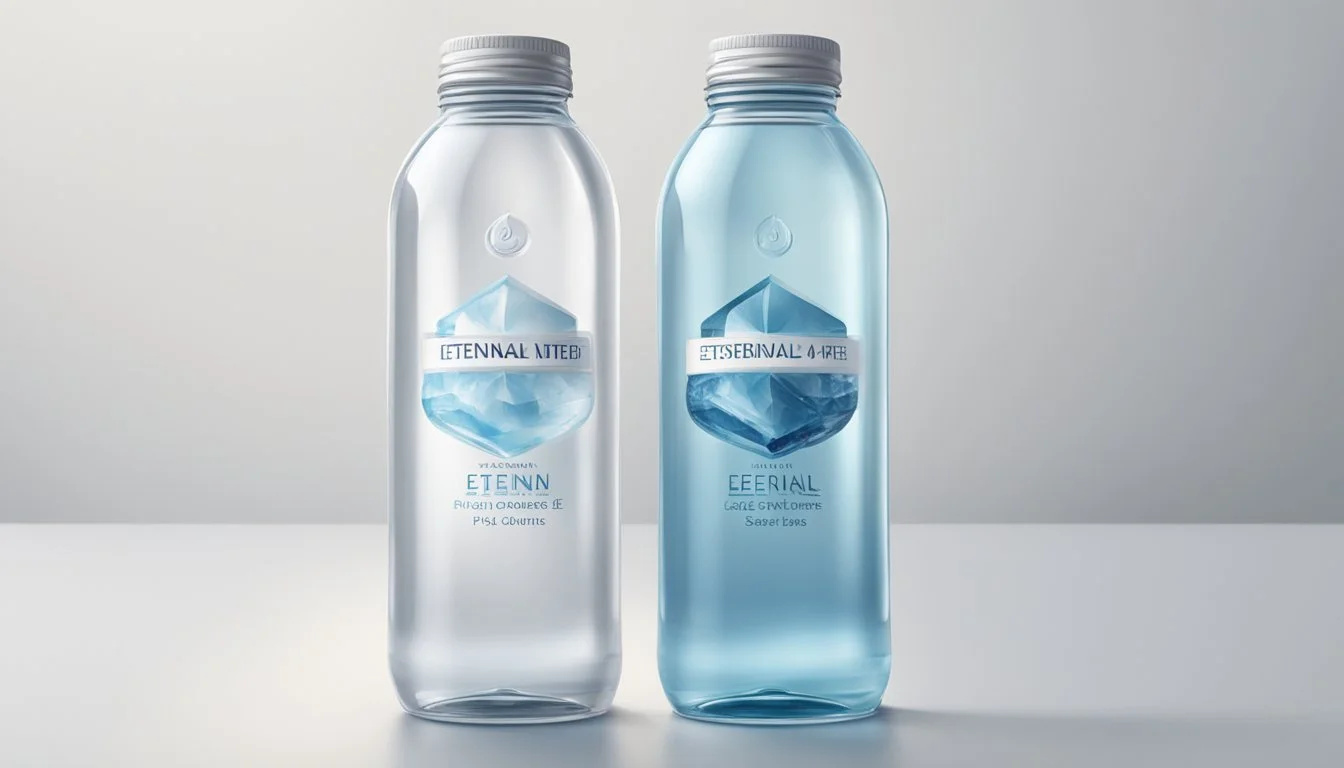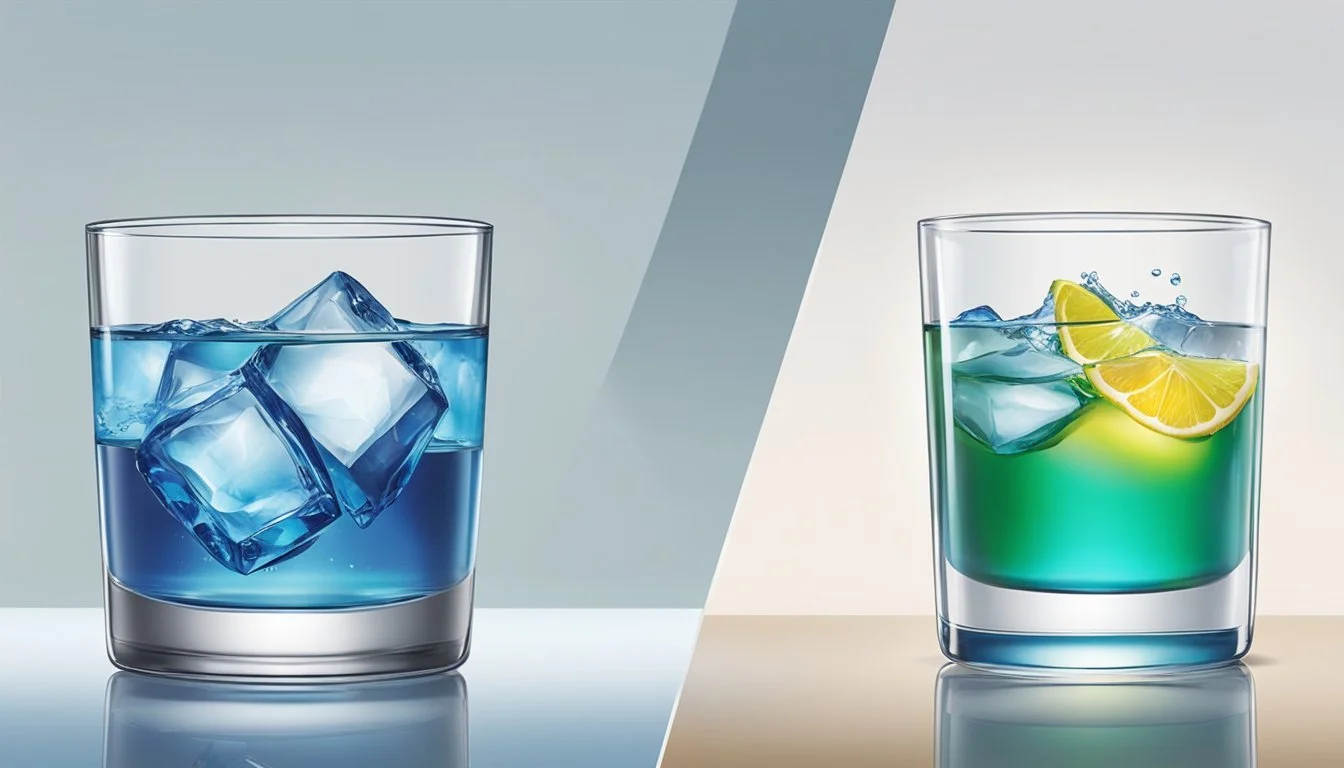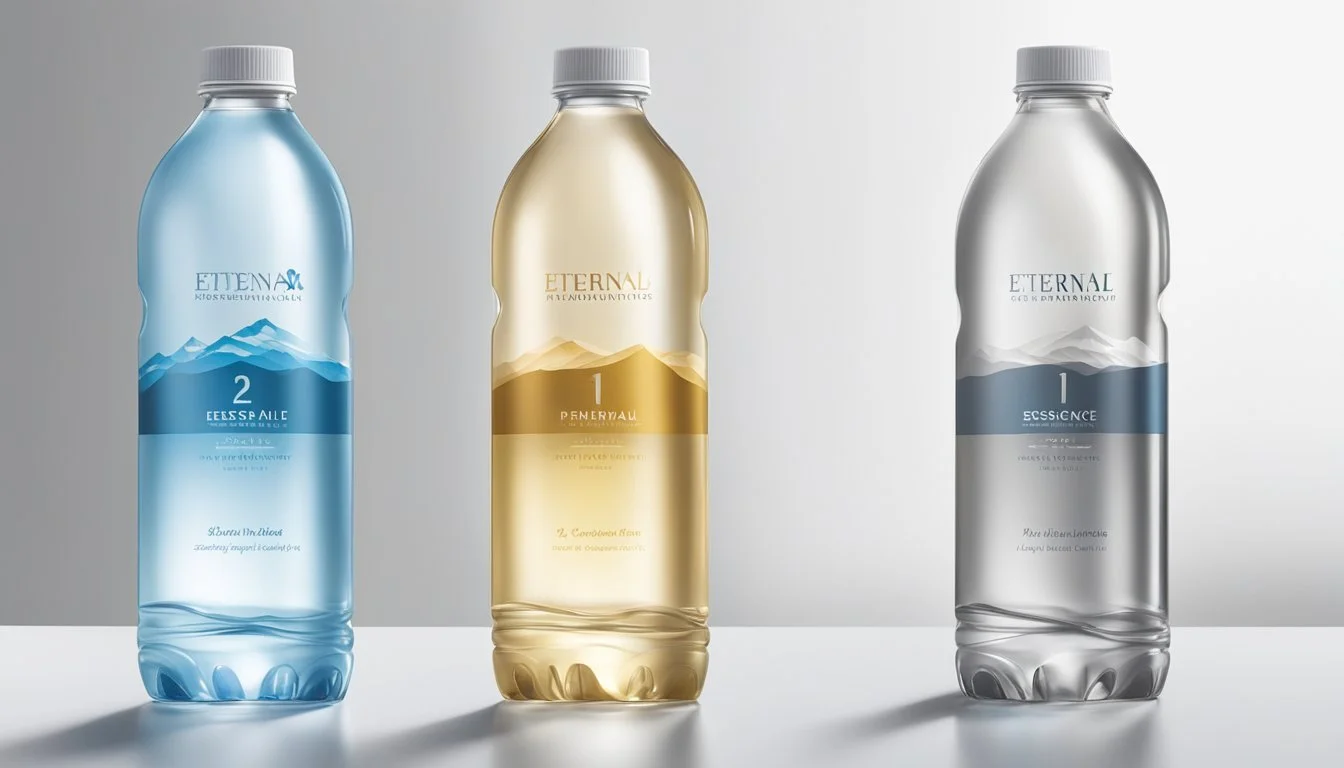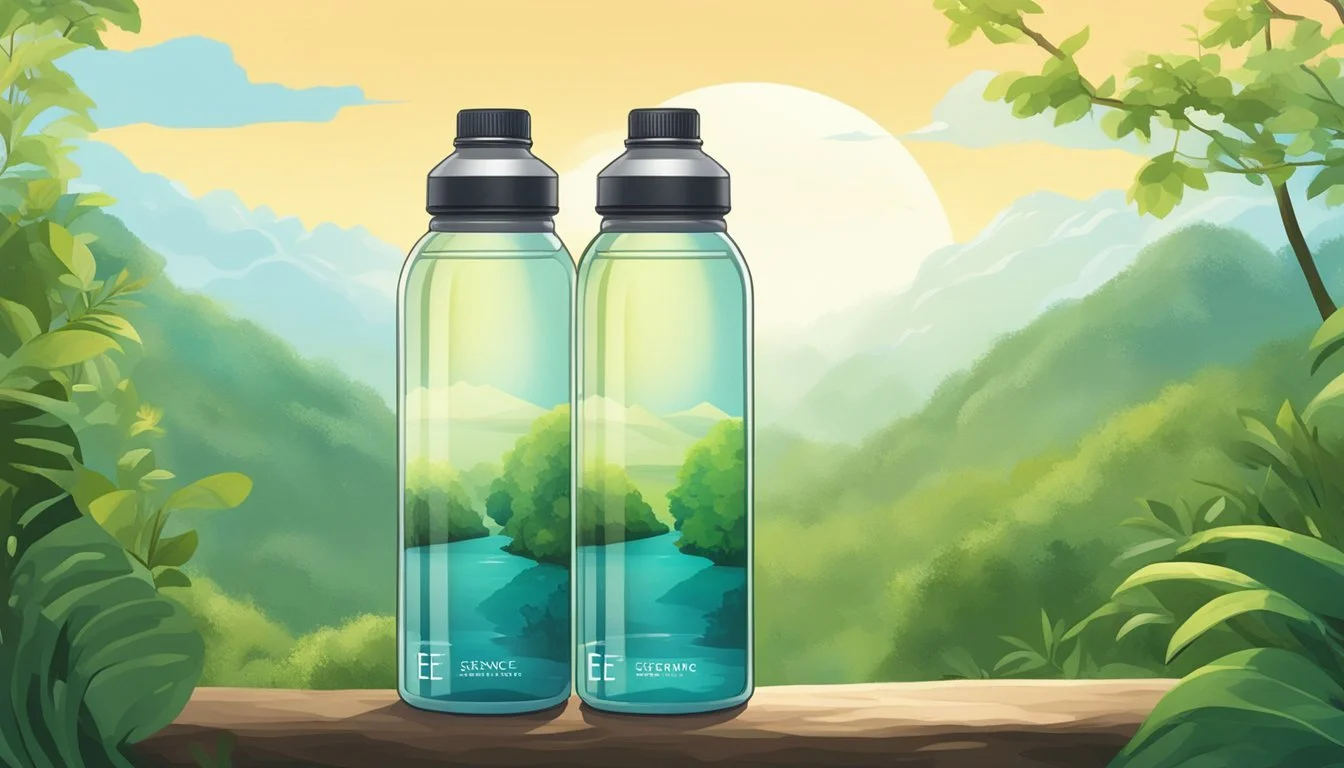Eternal vs. Essence pH10
Battle of the Purest Bottled Waters
Eternal and Essence pH10 are two popular bottled water brands, each boasting unique properties that cater to different hydration needs. Eternal water is naturally sourced and maintains its alkaline nature through a pH that ranges around 7.8 to 8.2. Essence pH10, on the other hand, achieves its high pH of 10.1 through a sophisticated ionization and reverse osmosis process, promising ultra-pure water infused with electrolytes.
Taste plays a crucial role for many consumers when selecting bottled water. Eternal's natural sourcing results in a crisp and refreshing flavor profile, while Essence pH10 offers a clean and smooth taste with added electrolyte benefits. For those seeking the purest and highest pH bottled water, Essence pH10 stands out with its advanced filtration methods.
When comparing Eternal and Essence pH10, it’s essential to consider the benefits each offers. Eternal provides a naturally balanced alkaline water suitable for daily hydration without synthetic additives. Conversely, Essence pH10 taps into advanced technology to enhance water purity and alkalinity, making it a preferred choice for those looking to maximize their hydration experience. Whether you prioritize natural sourcing or advanced purification, both brands present compelling options.
Understanding pH Levels in Bottled Water
pH level in bottled water can significantly impact its taste, safety, and hydration benefits. Different brands offer varying pH levels, which can range from acidic to alkaline.
The Science of pH and Hydration
pH is a scale used to measure how acidic or alkaline a substance is, ranging from 0 (most acidic) to 14 (most alkaline). A pH of 7 is neutral. In the context of bottled water, the ideal pH range for drinking is between 6.5 and 8.5.
Hydration benefits from water with a balanced pH are optimal because extreme pH levels may interfere with the body's natural pH balance. For example, highly acidic water can lead to tooth enamel erosion, while extremely alkaline water can disrupt normal digestive processes.
pH Levels Across Popular Brands
Different bottled water brands offer a variety of pH levels. Fiji Water, for instance, typically has a pH level of around 7.7, making it slightly alkaline. Dasani and Aquafina usually fall closer to the neutral range, around 7.
On the other hand, Voss and SmartWater are often marketed as premium brands with balanced pH levels aimed at hydration benefits.
Alkaline water brands, like Eternal and Essence pH10, claim to have higher pH levels, often above 9, promoting them as better for balancing the body's pH. However, it's crucial to ensure that the pH is within a safe and effective range for daily consumption.
Source and Purification Process
Eternal water and Essence pH10 utilize different sources and purification processes to create their bottled alkaline water. Understanding these differences is essential to making an informed decision about which bottled water suits your needs.
Natural vs. Artificial Alkaline Water
Eternal water is naturally alkaline, sourced from natural springs. As the water filters through ancient rock layers, it acquires natural minerals and maintains an alkaline pH level between 7.8 and 8.2.
In contrast, Essence pH10 water is artificially alkalized. The water undergoes a series of processes to achieve a pH level of 9.5 or higher, using ionization and the addition of electrolytes.
Reverse Osmosis and Filtration Techniques
Essence pH10 utilizes reverse osmosis and micro-filtration to achieve 99.9% purity. This method removes impurities and contaminants, ensuring that the water is both pure and alkaline.
Eternal water, while also filtered, relies on a natural filtration process as it passes through earthly layers. This method preserves its natural mineral content but does not achieve the same level of purity as Essence's technologically driven filtration.
Water Sources and Environmental Considerations
Eternal water is sourced from natural springs, where the water is naturally purified and collected. This method emphasizes environmental sustainability, as there is minimal human intervention in the water’s journey from source to bottle. However, this also means fluctuations in mineral content.
Essence pH10, on the other hand, comes from various sources but undergoes a rigorous purification process. The water is distilled and then enhanced to achieve high alkalinity and purity. Plastic bottles and BPA usage in bottling can be a concern, although both brands make efforts to use BPA-free materials.
Efforts to reduce the environmental impact of plastic bottles are vital, including recycling and using eco-friendly packaging options.
Composition of Bottled Water
Understanding the composition of bottled water is crucial for identifying which brand is better. Both Essentia and Eternal focus on the inclusion of minerals and electrolytes, as well as the exclusion of contaminants.
Minerals and Electrolytes for Optimal Hydration
Minerals and electrolytes play a vital role in maintaining hydration and overall health. Essentia water is infused with electrolytes like potassium, magnesium, and calcium. This combination not only enhances hydration but also provides essential nutrients to the body.
Eternal water contains natural minerals and electrolytes from its pure source. These naturally occurring elements aid in maintaining a balanced pH level.
Mineral Essentia Eternal Magnesium Yes Yes Calcium Yes Yes Potassium Yes Yes
Magnesium and calcium are particularly important because they support muscle function and bone health.
Assessing Additives and Contaminants
Additives and potential contaminants are significant factors to consider. Essentia undergoes processes like micro-filtration, reverse osmosis, and ultraviolet exposure to achieve 99.9% purity. This rigorous process aims to remove additives such as fluoride and chloride, while ensuring the water remains free from harmful contaminants.
Eternal water, being sourced directly from a pristine environment, minimizes the need for such extensive purification steps. This approach helps retain its natural mineral composition without introducing additional chemicals.
Contaminant Analysis:
Essentia: Uses advanced filtration methods to eliminate pharmaceuticals and bacteria.
Eternal: Relies on natural purity, minimizing the risk of added chemicals.
Both brands are careful about maintaining the quality and safety of their water, making them reliable choices for bottled water.
Health and Hydration
Hydration is crucial for maintaining various bodily functions, and different types of water, including alkaline options like Essentia and Eternal, offer unique benefits. This section explores the health and hydration benefits of these bottled waters.
Benefits of Proper Hydration
Staying hydrated is essential for overall health. Proper hydration supports bodily functions such as regulating body temperature, lubricating joints, and transporting nutrients. It also aids in digestion and helps maintain a healthy skin appearance. For those engaging in physical activities, hydration becomes even more critical to replace fluids lost through sweat.
Proper hydration can improve cognitive function and energy levels. Insufficient water intake can lead to dehydration, causing symptoms like fatigue, headaches, and impaired physical performance. Regular consumption of water helps avoid these issues and ensures that the body operates efficiently.
The Role of Alkaline Water in Health
Alkaline water, such as Essentia, has a high pH level, usually around 9.5 or higher. This type of water is believed to offer specific health benefits. Proponents claim that alkaline water can neutralize acid in the bloodstream, which might help in reducing acid reflux symptoms.
The electrolytes added to alkaline water also support better hydration compared to regular water. This can be especially beneficial for individuals involved in strenuous physical activity, as it helps to replenish electrolytes lost through sweat.
While scientific evidence supporting the extensive health benefits of alkaline water remains limited, many users report feeling more hydrated and energized after drinking products like Essentia. It's important to note that normal drinking water is generally sufficient for maintaining proper hydration.
Taste Profile and Aftertaste
Eternal and Essence pH10 offer distinct taste profiles and aftertastes, making each brand unique in its own right. This comparison focuses on the sensory experience provided by these two premium bottled waters.
Comparing the Taste of Eternal and Essence pH10
Eternal has a light, crisp taste. It is sourced from natural springs, giving it a refreshing quality. The taste is slightly sweet with subtle mineral undertones, making it smooth on the palate. There is no heavy or metallic aftertaste, allowing the natural flavors to linger pleasantly.
Essence pH10 boasts a more robust flavor profile. This water is purified and enhanced with electrolytes, leading to a distinct, almost velvety feel. Some describe its taste as slightly richer, with a hint of alkalinity. The aftertaste tends to be smooth but may have a mild mineral finish, which some consumers appreciate for its unique character.
In taste tests, Eternal is often praised for its pure, clean flavor, while Essence pH10 is noted for its enhanced hydration qualities and rich taste profile. Both brands stand out in their ways, making them favorites among bottled water enthusiasts.
Brand Analysis and Consumer Choices
When comparing Eternal and Essence pH10 bottled water brands, it's important to consider their market positions and how consumers perceive and remain loyal to these brands.
Market Position of Eternal and Essence pH10
Eternal and Essence pH10 occupy distinct positions in the bottled water market. Eternal water is known for its natural alkaline properties and sources from underground springs. The brand emphasizes purity and naturally occurring minerals, which appeal to health-conscious consumers.
Essence pH10, on the other hand, is marketed for its balanced pH level of 10.10, which promotes hydration and wellness. The precise pH level and added electrolytes are key selling points, attracting those focused on fitness and performance.
Major distribution channels like Amazon carry both brands, offering competitive pricing and accessibility. While Coca-Cola and PepsiCo dominate significant portions of the bottled water market with brands like Dasani and Aquafina, Eternal and Essence pH10 carve out niche segments through their unique attributes.
Consumer Perceptions and Brand Loyalty
Consumer preferences for Eternal and Essence pH10 are driven by distinct features. Eternal’s commitment to natural sourcing and minimal processing resonates with eco-conscious buyers. The brand’s reputation for purity and taste garners loyalty among customers seeking quality and sustainability.
Essence pH10 attracts a different segment of consumers. The high alkaline pH and added minerals appeal to fitness enthusiasts and those looking for specific health benefits. The brand's marketing highlights the balanced pH level, driving a perception of superior hydration and performance.
Both brands build loyalty through consistent quality and targeted marketing. While larger brands like LIFEWTR by PepsiCo dominate the broader market, Eternal and Essence pH10 maintain strong followings by emphasizing their unique selling points and catering to specific consumer needs.
Environmental and Ethical Considerations
Eternal and Essence pH10.10 bottled waters both bring unique attributes to the table, but environmental impact and sustainability practices play significant roles in determining which might be the better choice.
Bottled Water and Plastic Pollution
Plastic bottles contribute significantly to environmental pollution. Most single-use plastic bottles are not recyclable and end up in landfills or oceans.
Eternal Water uses BPA-free packaging. This reduces the environmental toxins released when plastic degrades.
Essence pH10.10 also commits to reducing plastic waste. They use recyclable PET plastic, which helps lower their carbon footprint. However, the issue of plastic pollution remains a challenge for both brands.
Sustainability Efforts by Water Companies
Eternal Water strives for sustainability by sourcing from naturally renewable aquifers. They emphasize minimal ecological disruption. Beyond the source, they have initiatives to reduce their energy consumption in production.
Essence pH10.10 emphasizes eco-friendly practices through their commitment to carbon-neutral production processes. They support reforestation projects to offset carbon emissions.
Both companies also engage in ethical practices, such as supporting local communities and ensuring fair labor practices. Essence takes it a step further by contributing a portion of their profits to environmental conservation efforts.
Conclusion
Eternal and Essence pH10 are both notable options in the bottled water market, each with its unique strengths.
Essence pH10 offers a consistent ionization process, ensuring an alkaline water with a pH of 9.5 or higher. Infused with electrolytes, it promises enhanced hydration and possibly some health benefits such as neutralizing free radicals.
Eternal, on the other hand, is naturally sourced and boasts benefits like improved digestion by balancing stomach pH levels. The natural origin appeals to those seeking organic options and minimal processing.
Health benefits from both waters are subject to individual experience, with some users reporting relief from indigestion and better overall hydration.
Environmental considerations are increasingly important. Eternal’s natural sourcing might lessen its environmental footprint compared to the more industrial process of Essence pH10.
The choice between Eternal and Essence pH10 ultimately depends on individual preferences for processing methods, perceived health benefits, and environmental impact.
Choosing the right bottled water involves considering these factors based on personal needs and values.
More About Eternal
Eternal vs Icelandic Glacial: Which Bottled Water is Better?
Eternal vs Kirkland Signature: Which Bottled Water is Better?
Eternal vs Mountain Valley Spring Water: Which Bottled Water is Better?
Eternal vs Richard's Rainwater: Which Bottled Water is Better?
Eternal vs Whole Foods Italian Still Mineral water: Which Bottled Water is Better?
More About Essence pH10
Aqua Carpatica vs Essence pH10: Which Bottled Water is Better?
Cascade Mountain vs Essence pH10: Which Bottled Water is Better?
Core Hydration vs Essence pH10: Which Bottled Water is Better?
Crystal Geyser vs Essence pH10: Which Bottled Water is Better?
Crystal Lake vs Essence pH10: Which Bottled Water is Better?
Hawaii Volcanic vs Essence pH10: Which Bottled Water is Better?
Hawaiian Springs vs Essence pH10: Which Bottled Water is Better?
Ice Mountain vs Essence pH10: Which Bottled Water is Better?
Icelandic Glacial vs Essence pH10: Which Bottled Water is Better?
Kirkland Signature vs Essence pH10: Which Bottled Water is Better?
Liquid Death vs Essence pH10: Which Bottled Water is Better?
Mountain Valley Spring Water vs Essence pH10: Which Bottled Water is Better?
Nestle Pure Life vs Essence pH10: Which Bottled Water is Better?
Poland Spring vs Essence pH10: Which Bottled Water is Better?
Proud Source vs Essence pH10: Which Bottled Water is Better?
Purely Sedona vs Essence pH10: Which Bottled Water is Better?
Richard's Rainwater vs Essence pH10: Which Bottled Water is Better?
San Pellegrino vs Essence pH10: Which Bottled Water is Better?
Simple Truth vs Essence pH10: Which Bottled Water is Better?
Solan de Cabras vs Essence pH10: Which Bottled Water is Better?
Talking Rain AQA vs Essence pH10: Which Bottled Water is Better?
Whole Foods 365 vs Essence pH10: Which Bottled Water is Better?
Whole Foods Italian Still Mineral water vs Essence pH10: Which Bottled Water is Better?






